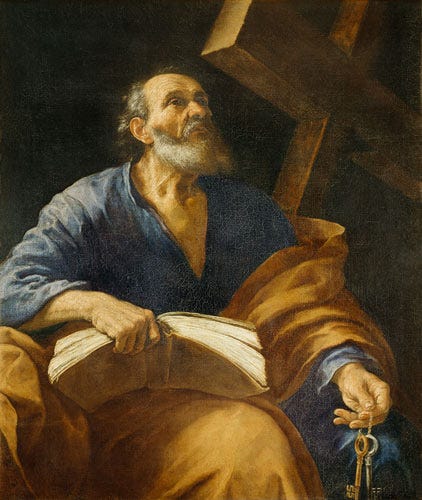As a young kid, I attended a Christian school run by the Church of Christ denomination. When I was in the second grade, my teacher, Miss Terrell, taught us about guardian angels.
I’ll never forget what she said: “Wherever you go and whatever you do, your guardian angel is always with you, watching you.”
The reason I’ll never forget what she said is because it absolutely terrified me! What she was describing was some kind of supernatural surveillance state!
It was made worse by the fact that, when you’re 7 years old, you suddenly become very body aware. I spent countless hours worrying that my guardian angel was watching me use the bathroom!
As the weeks passed, it got even worse. I started having nightmares about stoney-faced angels glaring at me, with swords in their hand. I was convinced angels were hiding in my dark closet, ready to crawl out and get me as soon as I fell asleep. I can’t even count the number of times I ran to my parents’ room and crowded in between them on the bed.
But even there, I couldn’t get relief. The angels were following me. Always scowling and always threatening to cause me harm.
There was no escape. “Wherever you go and whatever you do, your guardian angel is always with you, watching you.”
One evening, I finally fell asleep in my own bed. In the middle of the night, I woke up and noticed a warm light emanating from the end of my bed.
There at my feet was what appeared to be a little girl, about my age. She was dressed in a white chiffon robe, and glowing like the sunlight at golden hour from head to toe. Though appearing like a child, she had an intense, warm presence.
I sat up in bed and looked into her face. She didn’t say anything, but looked back at me knowingly. Suddenly, an overwhelming sense of peace washed over me. I laid back down and fell asleep.
After that encounter, I was a different person. I was never afraid of angels again.
The next morning, I told my parents what I had seen. Though skeptical at first, they kept an open mind. When they realized I was cured of my terror, they came to accept that something really had happened.
At school that day, I drew a picture of myself sitting up in bed, with the angel standing at the foot of the bed. When Miss Terrell asked me to describe my drawing, I told her about my night.
And you know what’s funny? She didn’t believe me.
At the time, I was incredulous! How could the person who told me about angels not believe what I had seen and experienced?
—
Now, as an adult, I understand it better. I can muster more sympathy for Miss Terrell.
The truth is, I think most of us have trouble believing that unlikely or miraculous events really happened, even when they happened to us.
We don’t trust our instincts. We think we must have gotten something wrong: maybe we misunderstood or misremembered. Maybe we were too young or too tired or too gullible.
And even if we do leave room for the possibility, what does that mean for all the times the thing we prayed for didn’t happen?
In a culture dominated by rationalism, denial seems like our best option. Because, if we actually dare to believe in a miracle, people will think we’ve lost our minds!
—
Today we meet the disciples as they grapple with their own tangled up feelings of joy, fear, and doubt in the face of a very unlikely event.
And we watch, as they try to muster the courage to believe, and then proclaim, that something miraculous has really happened.
—
To get a better understanding of what’s going on, let’s put this passage in context:
At this point in Luke’s story, the women have talked to angels at an empty tomb, and two men have encountered a strange man on the road to Emmaus.
After breaking bread with this apparent stranger, Luke tells us that “their eyes were opened, and they recognized” that it was Jesus. ‘They said to each other, “Were not our hearts burning within us while he was talking to us on the road.’”
Even before they consciously recognized that it was Jesus, they sensed his presence in their heart. But, in the space between their heart and their rational mind, doubt wedged its way in. And in the time it took to interpret their experience, the story was already starting to get fuzzy.
So, when the two men tell their friends about their dinner with Jesus, it is easy for everyone in that room to be skeptical.
Even after Jesus shows up, in the flesh, still bearing wounds, they’re not convinced. They’re still afraid to trust themselves. They’re still afraid of what everyone else will think.
It’s easier, in some ways, to tell themselves they’re losing their minds, than it is to admit that their friend came back from the dead.
Sometimes, it’s easier to believe in ghosts than in God.
—
Like those first Christians, we catch glimpses of the Divine, but we’re so quick to shut our eyes again. We hear stories of miracles, but we’re so eager to chalk them up to coincidence.
We come to church each week for communion, praying for Christ to be “known to us in the breaking of the bread.” But then we leave, not expecting this divine encounter to fundamentally change our lives.
Whether you have personally had a mystical experience or remarkable vision, you have been invited to come to the table, where Jesus offers himself.
Here at the communion table, Jesus says, “Look! It’s me, bread made flesh, wine made blood. Look! It’s you, the Body of Christ, still transforming the world.”
Like the disciples, we encounter the resurrected Christ whenever we reach out our hands and accept the bread of heaven.
Our first task is simply to show up and experience this gift of Christ’s presence.
Our next task, as the disciples will attest, is the harder one: to take the risk of believing that Jesus is present with us, and capable of changing our lives.
—
Our Scriptures speak to the timelessness of doubt – they remind us that skepticism is so very human. And Jesus, who lived and died as one of us, knows what it feels like to be human.
He knows that believing in a miracle is just as anxiety-inducing as it is wondrous. He knows that proclaiming resurrection puts us at terrible risk in a society more bent on death than on life.
And the truth is, we can’t explain the mechanics of the Kingdom of God. Try as we might, we can’t rationalize divine encounter or divine transformation.
The life of faith can’t be wrapped up in a tidy proof. That doesn’t mean it isn’t true.
Here, at the table, Christ calls us to leave a little room for possibility. He challenges us to expect a divine encounter. And to trust that God is near when our hearts begin to burn within us.
Each week as we gather, we are learning how to believe in the miracle of resurrection.
With our minds broadened to the possibility of hope, we have the strength to venture back out into a world of so many unknowns, and trust that God is transforming it.
—
Eat this bread, drink this cup. Leave a little room for a divine encounter. As the disciples can tell you, it might just change the world.



















